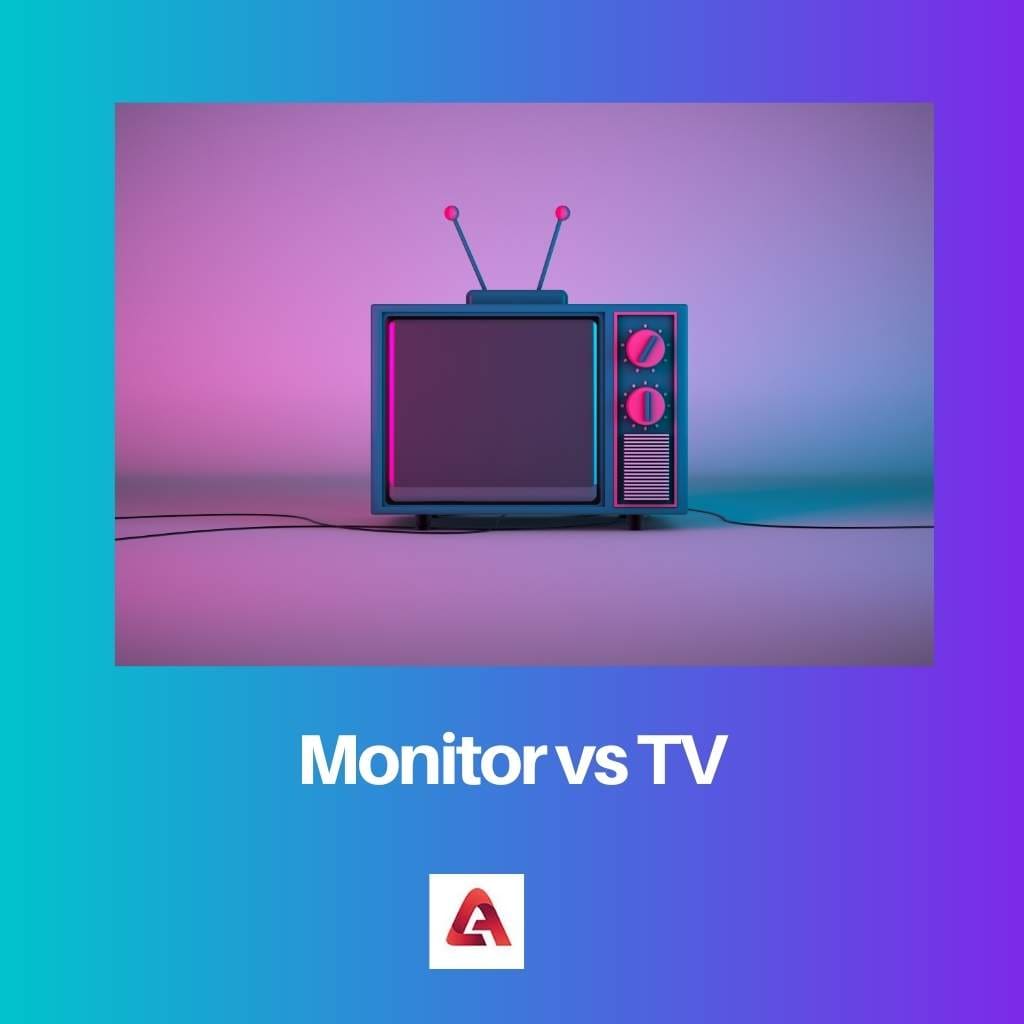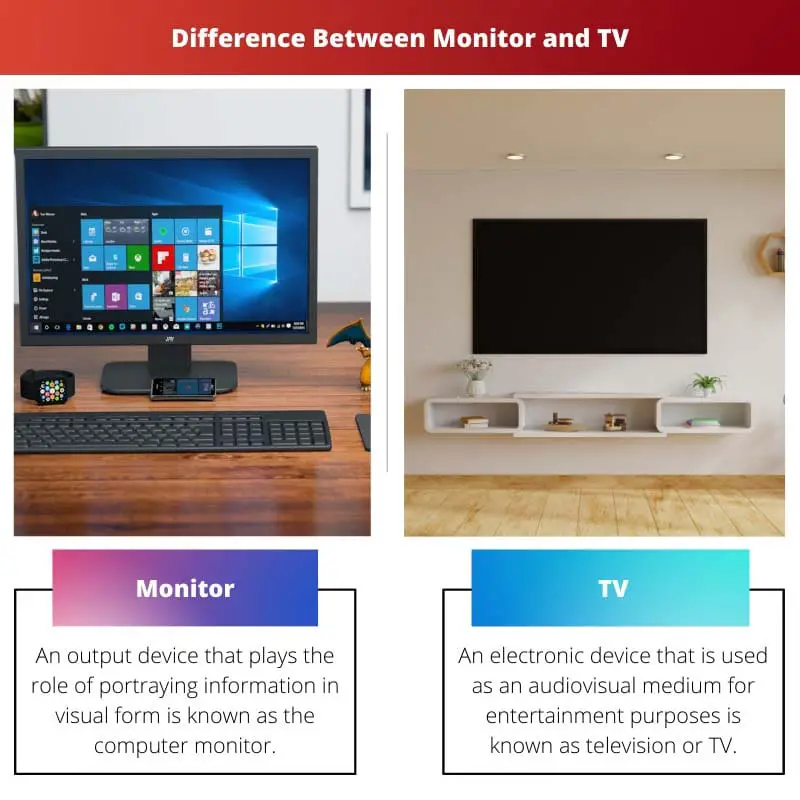Today there exist several electronic devices. These electronic devices have their independent function, characteristics, uses and roles. A certain electronic device is composed of several other parts.
For example, a keyboard is made up of a circuit. Other than that, an entire set of computers needs various parts and other electronic devices for efficient working.
A television set requires several other parts so that it works effectively. Several electronic devices are used for displaying visual effects and other things that a user can see.
These devices are confused as one. These devices have their different roles, uses, compositions and properties. Two such devices are 1. Monitor, and 2. TV or television.
Key Takeaways
- Monitors are designed to display computer-generated images and have higher resolutions than TVs.
- TVs have built-in speakers and tuners, while monitors do not.
- Monitors have faster response times and are better for gaming and computing, while TVs are better for watching movies and TV shows.
Monitor vs TV
Monitors are primarily designed for use with computers and other devices that require high-resolution displays. They come with many models offering Full HD (1080p) or even 4K Ultra HD resolutions. TVs are designed for home entertainment and come in a wider range of sizes, starting at 32 inches and going up to 75 inches or more. They also come with many models offering 720p or even 4K Ultra HD resolutions.

An output device that plays the role of portraying information in visual form is known as the computer monitor. Initially, computer monitors were used for only processing data, but later on, it was also used for entertainment purposes.
Visual Display Units or VDU was the former term that was used to address computer monitors, but later on, it became out of use.
An electronic device that is used as an audiovisual medium for entertainment purposes is known as television or TV. Monochrome or coloured moving images are transmitted by means of television.
As of 2019, almost 80% of households present all around the world owned a television set. Various media content is broadcasted on television, and people use television as an entertainment source.
Comparison Table
| Parameters of Comparison | Monitor | TV |
|---|---|---|
| Meaning/ Definition | An output device that plays the role of portraying information in visual form is known as the computer monitor. | An electronic device that is used as an audiovisual medium for entertainment purposes is known as television or TV. |
| Size | Small | Available in all sizes |
| Resolution | High | Low |
| Input Jacks | More | Less |
| Tuner | Absent | Present |
What is Monitor?
An output device that plays the role of portraying information in visual form is known as the computer monitor. It is an important part of a computer set.
It helps a user to understand a certain thing that is going on on the computer better, and it also helps the user to manage their actions and commands better.
Initially, computer monitors were used for only processing data, but later on, it was also used for entertainment purposes. Visual Display Units or VDU was the former term that was used to address computer monitors, but later on, it became out of use.
Many modern features have been introduced to a computer monitor ever since its establishment. Monitors that are used by the latest generation use power-saving mode.
They also have indicator lights for the detection of various modes. Many accessories that are integrated are also available. There are also touchscreen monitors available that have ultra-wide screens.
Many other professional features are also introduced to the monitors that, include the usage of anti-glare and anti-reflection screens, directional screens, and tablet screens.
Here are several types of monitors available as well, including desktop monitors etc. They are differentiated based on the type of mounting provided to them.

What is TV?
An electronic device that is used as an audiovisual medium for entertainment purposes is known as television or TV. There are several types of television sets. People choose the sets according to their preferences and convenience.
Televisions broadcast a variety of content and provide an entertainment source to people.
Monochrome or coloured moving images are transmitted by means of television. As of 2019, almost 80% of households present all around the world owned a television set.
Various media content is broadcasted on television, and people use television as an entertainment source. Television sets are addressed by several other names as well.
Television sets are also known as telly or TV. Several types of television sets are differentiated based on various parameters.
For instance, televisions based on their technology, televisions based on screen type, televisions based on their resolution, televisions based on their features etc. Many improvements have been introduced to several types of televisions.
These several types include a quantum light-emitting diode, organic light-emitting diode display, LED TVs, LCDs or liquid crystal display, DLP or display light processing, plasma panels, direct TV, flat and curved screen televisions, 720p and 1080p televisions, 4k and 8k resolution televisions, smart televisions, HDR or high dynamic range televisions, voice-activated televisions etc.

Main Differences Between Monitor and TV
- An output device that plays the role of portraying information in visual form is known as the computer monitor. On the other hand, an electronic device that is used as an audiovisual medium for entertainment purposes is known as television or TV.
- A monitor has a high resolution. On the other hand, a TV has low resolution.
- A monitor is smaller in size. On the other hand, a TV is available in all sizes.
- A tuner is absent in the monitor. On the other hand, a tuner is present on a television.
- The number of input jacks on the monitor is more than the number of input jacks on the TV.
- A monitor can not be made on a curved screen. On the other hand, television sets can be made on curved screens.
- The image lagging is less on monitor than the image lagging on TV.
- A monitor has a good refresh rate. On the other hand, a TV has a mediocre refresh rate.

- https://books.google.com/books
- hl=en&lr=&id=L2GIAgAAQBAJ&oi=fnd&pg=PP1&dq=Television+&ots=AIkoO6V6RW&sig=mi9oDRa8M5M2xK6bielZWD1JXmk.https://onlinelibrary.wiley.com/doi/abs/10.1002/col.5080140107

Great comparison between monitors and TVs. Very informative.
I agree, it was well explained.
Definitely, a great article.
I liked the detailed explanation of the features and types of monitors. Very interesting.
Agreed, I learned a lot from it.
The article provides a great overview of the history and uses of monitors and TVs
Definitely, great information.
I agree, very informative.
The information on the types of television sets and their categorization based on various parameters is enlightening.
The comparison table was very helpful in understanding the differences between monitors and TVs.
Yes, it provided a clear visual representation of the information.
The explanation of the professional features and types of monitors available is quite informative.
I had no idea about the former term ‘Visual Display Units’. Very informative.
Me neither, but it’s interesting to learn!
I like how the article explains the differences between monitors and TVs
Yes, the comparison table was very informative.
That’s interesting. I didn’t know about the % of households that own a TV
I agree, it’s surprising!
Yes, that was a surprising fact.
I appreciate the in-depth description of the role and history of televisions, including their global adoption.
The comparison table provided is a great summary of the key differences between monitors and TVs.
The detailed descriptions of both monitors and televisions allow for a comprehensive understanding of their respective roles and characteristics.
The article provides a clear definition of the two electronic devices.
Agreed, it was very thorough.
The description of the different types of TV sets was very helpful.
I found it useful too.
The significance of television as an entertainment source and its widespread use globally is effectively conveyed in this article.
The comparison between monitors and TVs in terms of size, resolution, and input jacks is very clear and easy to understand.
The article does an excellent job of explaining the functions and advancements of modern computer monitors, including touchscreen and energy-saving features.
This article provides an extensive comparison between monitors and televisions, highlighting their differences in function and purpose.
Absolutely, the detailed information on input jacks, resolution, and other features is very helpful.
The information about the professional features of monitors was enlightening.
Yes, I appreciate the level of detail in the article.
Me too, very informative.
The article beautifully elaborates on the historical evolution and technological advancements of both computer monitors and televisions.